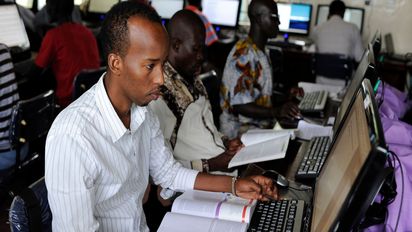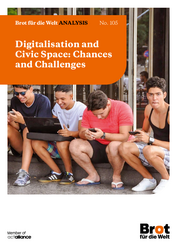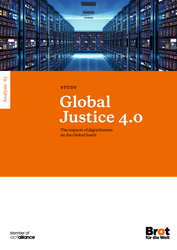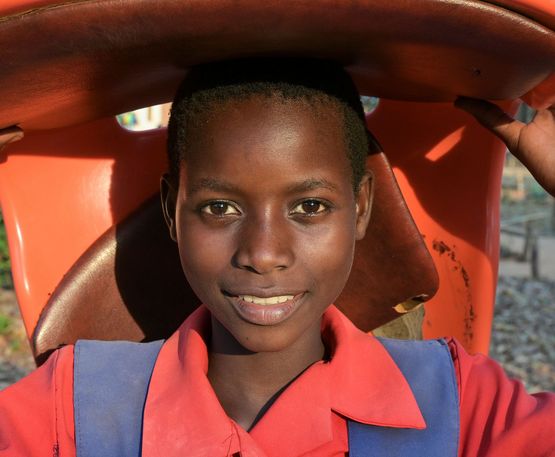
Fair Digitalisation for Everyone around the World
African start-ups are inspiring the digital world, while most people in Africa have no Internet access whatsoever. In Asia, there are regional differences between digitalisation centres like Korea and countries like Papua New Guinea, where you can only access the Internet in a few towns and cities. Even though two thirds of the population in Latin America use the Internet, there is a gap between rich and poor and between urban and rural areas. In order to close the digital divide, poor countries must enjoy the same rights and support as rich countries.
No Digital Dividend for the Poor
A World Bank study shows that the digital dividend from higher growth, more jobs and better public services, has so far failed to materialise in the Global South. Only a small group of wealthy and well-educated people are reaping the benefits of Industry 4.0. The South has also failed to benefit from the liberalisation of the information market, which was being pushed through by industrialised nations as early as 1995.
Developing countries consistently place last in the E-commerce index of the UN organisation “UNCTAD”; in particular, they lack the necessary infrastructure. For instance, 75 percent of people in sub-Saharan Africa have no Internet access, while as many as 95 percent lack access in Niger, Burundi and Chad. However, there are other countries that have seen success.
“
„If we want to prevent the gap between rich and poor from growing, we need to make digitalisation fair.“
Sven Hilbig, Policy Advisor Digitalization at Brot für die Welt
Government Support for Digitalisation: a Recipe for Success
Although India and China are exceptional cases in terms of digitalisation, their impressive achievements are the result of massive state support rather than a self-regulating market. The rise of Bangalore as India’s Silicon Valley is clearly based on supportive economic policies such as the development of technology parks, export incentives and tax breaks.
Back in the 1990s, China was still a nobody in terms of the production of digital goods. With a market value of around 13 billion US dollars in 2017, it is the undisputed leader when it comes to the export of intangible goods, far ahead of Germany (8 billion US dollars) and the USA (6 billion US dollars). The country protected itself from foreign companies, built its own digital infrastructure and successfully created Chinese Internet platforms.
For Digital Equality of Opportunity
Policy-based backing already made the difference between winners and losers in analogue trade. That is why we urgently need a cooperative trade and economic policy that creates equal opportunities in digital competition. Whether industrial products or digital goods are involved, trade relationships must become fairer. This involves the following (among other things):
- Establishing a country’s own digital economy
- Protecting the data sovereignty of each country
- Modern and adapted IT infrastructure for developing countries
- Providing equal Internet access for everyone
- Funding domestic start-ups
- Supporting traditional companies with their digital transformation process
This would give developing countries the same policy-based backing as Germany.
What Brot für die Welt does
We examine the current impact of digitalisation on the Global South and provide policymakers with proposals for a forward-looking and fair digitalisation process. Together with our project partners, we put our ideas forward at both the national and international level. Our partner SEATINI from Uganda, for example, advises the government on trade agreements and warns them not to accept a ban on national regulations on data exchange. In India, “IT for Change” is working, among other things, on frameworks for controlling digital monopolies from the USA and China. The Just Net Coalition is a global network that has been working successfully for years to improve the social participation of disadvantaged groups and nations. It cooperates with the Internet Governance Forum (IGF), a multi-stakeholder forum hosted by the United Nations.
Downloads


Unterstützen Sie uns


Hinweis: Die Spendenbeispiele sind symbolisch. Durch Ihre zweckungebundene Spende ermöglichen Sie uns dort zu helfen, wo es am dringendsten ist.
50 € (Spendenbeispiel) Mit 50 € kann z.B. eine Permakultur-Schulung in Malawi finanziert werden. So lernen Familien, wie sie dank Permakultur auch in den Dürre-Perioden frisches Obst und Gemüse ernten können.
100 € (Spendenbeispiel) Mit 100 € können z.B. 50 Spaten für das Anlegen von Gemüsegärten in Burkina Faso gekauft werden. Dort wird vermehrt auf dürreresistentes Saatgut gesetzt, um trotz Klimawandel genug zum Überleben zu haben.
148 € (Spendenbeispiel) Mit 148 € kann z.B. ein Regenwassertank mit 2.000 Liter Fassungsvermögen in Bangladesch gekauft werden. Dort versalzen immer mehr Wirbelstürme die Böden und das Grundwasser, Trinkwasser ist Mangelware.
Hinweis: Die Spendenbeispiele sind symbolisch. Durch Ihre zweckungebundene Spende ermöglichen Sie uns dort zu helfen, wo es am dringendsten ist.
50 € (Spendenbeispiel) Mit 50 € kann z.B. eine Permakultur-Schulung in Malawi finanziert werden. So lernen Familien, wie sie dank Permakultur auch in den Dürre-Perioden frisches Obst und Gemüse ernten können.
100 € (Spendenbeispiel) Mit 100 € können z.B. 50 Spaten für das Anlegen von Gemüsegärten in Burkina Faso gekauft werden. Dort wird vermehrt auf dürreresistentes Saatgut gesetzt, um trotz Klimawandel genug zum Überleben zu haben.
148 € (Spendenbeispiel) Mit 148 € kann z.B. ein Regenwassertank mit 2.000 Liter Fassungsvermögen in Bangladesch gekauft werden. Dort versalzen immer mehr Wirbelstürme die Böden und das Grundwasser, Trinkwasser ist Mangelware.


